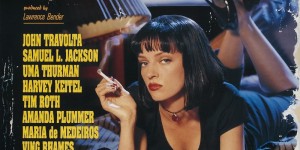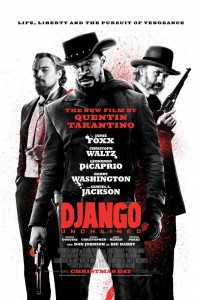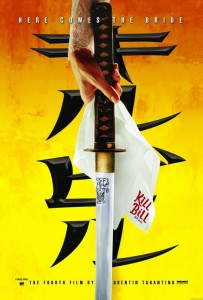The renowned music supervisor visits SPOT Festival on the 2nd of May to tell SPOT about the music behind the films. We talked to her before her visit.

The casual moviegoer may not know her name, but when they leave the theater humming one of the songs from the score, most likely Mary Ramos had her hands on it. She is a music supervisor and during her 20 years in the industry she has worked on more than a 100 movies. Most prominent is her cooperation with the master director Quentin Tarantino.
GAFFA receives a call from Ramos, who is situated on the other side of the Atlantic, more specifically Los Angeles.
What exactly does a musical supervisor do?
– Every assignment is different from the previous, like every director is different. I approach the task as a support for the director. All directors have a passionate connection to the story they want to tell, and I see it as my task to help the director tell that story. Music is such an integral part of a movie. That’s why I handle all musical aspects of the movie – and that includes actors having to perform songs on camera and getting the right songs for preproduction to the score. Among other things I help the director to choose the right score for the movie.
How did you meet Quentin Tarantino and how is he to work with?
– He’s actually the reason why I’m a music supervisor. I met him through a mutual friend, Tim Roth, when they were making Reservoir Dogs together. I’ve always loved music, especially soundtracks and scores. We talked about that and I ended up working on Pulp Fiction, where I worked as music coordinator. Since then I have worked as music supervisor on all his other movies. He must be the biggest music and movie fan I’ve ever met. He’s extremely passionate about music choices. He’s passionate about the story he wants to tell, and often the music is interwoven with the story he is telling, because they’re referencing other movies. The music underlines a point he wants to make. It’s my task to help him bring his ideas to life. He is incredibly fascinating to work with. He listens to music all the time, even when he’s working on his scripts, and that’s why music is such an important part of his movie universe. It’s a part of the movie from the beginning.
His soundtracks are very popular and they consist mostly of known songs. Does he ever use new music in his movies?
– On the soundtrack for Django Unchained we actually had new songs written especially for that movie, which is a new thing for Tarantino. It was very exciting to have new songs that just lifted the movie. The older songs are amazing, but to get to add fantastic songs like Freedom by Anthony Hamilton and Elayana Boynton and John Legend’s song “Who Did That To You”, which is used in the scene where Quentin blows up, and Django sets off to take his revenge. I actually helped creating a specific piece of music for the movie. It was a mash-up of Tupac and James Brown’s The Payback. It was an incredible experience.
How about cases where you need pre-existing songs – do you ever run into trouble using them?
– Sometimes you get a good idea in the last minutes, and then you have a very short amount of time, sometimes only 24 hours, to get the rights cleared. For Kill Bill we needed the song “Don’t Let Me Be Misunderstood” by Leroy Gomez and Santa Esmeralda. Amazing song. We tracked the master rights to Universal and Universal France, but they simply said no to our usage. There was a big mess concerning the lead singer and the other band members. But I just couldn’t take no for an answer, so I tracked down Leroy Gomez to his residence in France through hard research. First I stumbled upon his father’s obituary, and I tracked him to Detroit. I basically called every Gomez in Detroit, until I got a hold of Leroy’s mother and she gave me his phone number. When I finally reached him, time was running out, so I told him he had a unique opportunity and that he should get a hold of his former band members and record label to help clear the rights. I would say that within 48 hours we found a solution. It was hard work, summoned by research and passion.
Do musicians miss out on their royalties?
– Yes, especially with older songs where the rights aren’t clearly defined. Often when I track down a song it is both beneficial for both the movie and the musician, because I also help the musician to get to know their rights. That way the musicians get their rightful income back. A thing I have learned through my career, when it comes to musicians, is: keep your stuff current. Not only does it ease my job, if I need your song in a movie, but it’s also a big opportunity to get your song heard. If I can’t find you, I can’t use you.
How would you describe the role of music in a movie – both as a score, but also when an actorportrays a musician?
It’s all about helping to tell the story, and that means paying attention to detail. Music almost performs as an actor in a role, because the story needs it to do so, in helping create something that is essential for the movie. It comes down to what helps tell the story. When actors are portraying musicians in movies, a music supervisor can help in making them feel comfortable in that role. I work a lot on finding a voice that actually suits the actor’s voice and on making the actor comfortable singing.
How would you describe the beneficial effects for the musician having his or her songs used in a movie?
– I have previously gotten The National to write the song Think You Can Wait for the movie Win Win. And that is sort of a win-win, because it helps making the band visible for a large audience, while also creating a beautiful moment in the movie. One of the biggest aspects of Tarantino’s movies is that it’s very beneficial for a musician to be a part of his movies. They breathe new life into whole careers, and they help pave the way for an international audience.



